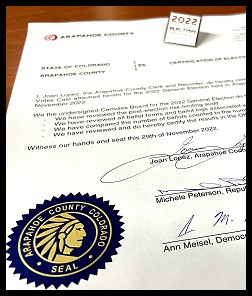 Non-profit government watchdog, Citizens for Ethics in Washington (CREW) has detailed what they describe as an illegal plot among Trump-supporting county election officials to sabotage the certification of the 2024 election results.
Non-profit government watchdog, Citizens for Ethics in Washington (CREW) has detailed what they describe as an illegal plot among Trump-supporting county election officials to sabotage the certification of the 2024 election results.
The scheme has been reported elsewhere in recent days, including in an excellent deep dive by Justine Glawe at Rolling Stone, reporting on "nearly 70 pro-Trump election conspiracists currently working as county election officials [in battleground states] who have questioned the validity of elections or delayed or refused to certify results."
In a lengthy and detailed State-by-State Analysis [PDF] released this week, CREW is offering a roadmap of legal remedies in each of eight battleground states that, if followed, they believe can defeat the looming threat posed by such a scheme and ensure timely certification of results in this November's Presidential election...
It is a matter of settled law, CREW argues, that the act of certification is little more than a "ministerial function" and that county election officials lack "discretionary" authority to refuse to certify results after canvassing has been completed. Yet, CREW has identified 35 county election officials from eight states --- Arizona, Colorado, Georgia, Michigan, North Carolina, New Mexico, Nevada and Pennsylvania --- "who previously refused to certify elections in apparent violation of state and federal law, and who may be in a position to do so again."
Although "states have shut down these dangerous efforts to date," CREW asserts that "the threat of disruption looms large in this year's elections."
Before providing their state-by-state break-down of the remedies available to voters, candidates and voting rights organizations, as well as to state and federal authorities, the report lays out a set of general recommendations, beginning with placing Trump-supporting election officials on notice for potential civil and criminal penalties that could be levied against them if they unlawfully refuse to certify vote tallies...
• States authorities should bring expedited mandamus litigation to swiftly resolve certification disputes in the state’s highest court, as New Mexico and Nevada authorities have.
• States should utilize mechanisms, where available, for state election officials to step in to certify elections in place of obstructionist county officials.
• States should utilize mechanisms, where available, for state election boards or courts to remove county officials who willfully disregard their legal duties, as North Carolina, New Mexico and Nevada have in place.
• If county officials willfully violate the law, state authorities should pursue appropriate civil or criminal remedies. If state authorities fail to act, then federal authorities should pursue appropriate civil and criminal remedies to protect federal voting rights.
CREW's analysis for each state breaks down not only specifics as to how to fend-off illegal refusals to certify but, by way of specific instances, serves as a warning to every election official who may be contemplating illegitimate delays or denials of certification.
For example, Cochise County, AZ Supervisors Tom Crosby and Peggy Judd, "citing purported concerns about voting machines", twice voted to postpone certification of the 2022 election results. The AZ Secretary of State and an advocacy group sought and obtained a court order compelling certification in the County. The order didn't issue until three days after the statutory certification deadline. Despite the fact that one of the two supervisors, Judd, ultimately voted to certify in compliance with the court order, both Crosby and Judd were later indicted. They were charged with two felonies: "interference with an election officer and conspiracy."
Another example reveals how the threat of criminal and civil contempt penalties caused two of the three-member Board of Supervisors in Otero County, NM to reverse an earlier refusal to certify results of a 2022 primary election. A court subsequently not only removed the third Supervisor, who refused to certify despite a court order, but also permanently disqualified him from ever again holding public office.
CREW provides specific examples of what they characterize as unlawful delays and refusals to timely certify in all eight states. While precise potential for either criminal indictments or contempt of court varies in each state, they detail serious consequences in all eight for those who take part in a plot to block certification.
The report also sets forth rights that would be violated by unlawful delays and refusals to certify under federal statutes and provisions of the U.S. Constitution, and the potential for criminal charges under applicable federal statutes.
CREW has performed a major public service in providing a legal roadmap for election law attorneys, as well as for state and federal authorities. But there's also a need for both local and national media to play an active role. There's been widespread coverage of individuals now under indictment for taking part in Donald Trump's failed 2020 "fake electors" plot in several different states. Similar widespread coverage of indictments or other adverse legal consequences for participation in unlawful schemes to block certification could dissuade many individuals who might otherwise participate in such a scheme following November's critical general election.
UPDATE, 9/6/24: The ACLU filed a Complaint [PDF] in a Michigan state court seeking an order that will compel election denying Republican Kalamazoo County Supervisor Robert Froman to comply with MI law, which mandates "that county canvassers...certify election results." Froman, who still believes the 2020 Presidential Election was stolen, told the Detroit News that if the 2024 election "unfolded the same way the 2020 one did," he'd refuse to certify it, the ACLU complaint alleges.
Ironically, Trump recently admitted he'd lost the 2020 election "by a whisker".
 Ernest A. Canning is a retired attorney, author, and Vietnam Veteran (4th Infantry, Central Highlands 1968). He previously served as a Senior Advisor to Veterans For Bernie. Canning has been a member of the California state bar since 1977. In addition to a juris doctor, he has received both undergraduate and graduate degrees in political science. Follow him on Twitter: @cann4ing
Ernest A. Canning is a retired attorney, author, and Vietnam Veteran (4th Infantry, Central Highlands 1968). He previously served as a Senior Advisor to Veterans For Bernie. Canning has been a member of the California state bar since 1977. In addition to a juris doctor, he has received both undergraduate and graduate degrees in political science. Follow him on Twitter: @cann4ing


 Sunday 'Cutting Corners' Toons
Sunday 'Cutting Corners' Toons 'A World of Tyrants,
'A World of Tyrants, 'Green News Report' 5/22/25
'Green News Report' 5/22/25
 'Dangerous Times': Climate Scientist Warns Trump 'Censorship' Endangering Nat'l Security: 'BradCast' 5/21/25
'Dangerous Times': Climate Scientist Warns Trump 'Censorship' Endangering Nat'l Security: 'BradCast' 5/21/25 And Then They Came for Members of Congress...: 'BradCast' 5/20/25
And Then They Came for Members of Congress...: 'BradCast' 5/20/25 'Green News Report' 5/20/25
'Green News Report' 5/20/25 Appeals Court Blocks Last Route for Voters to Challenge Violations of the VRA: 'BradCast' 5/19/25
Appeals Court Blocks Last Route for Voters to Challenge Violations of the VRA: 'BradCast' 5/19/25 Sunday 'Now Hoarding' Toons
Sunday 'Now Hoarding' Toons Mad World:
Mad World: 'Green News Report' 5/15/25
'Green News Report' 5/15/25 Plane Corruption and the Future of the DOJ: 'BradCast' 5/14/25
Plane Corruption and the Future of the DOJ: 'BradCast' 5/14/25 'Deeply Evil': GOP Proposes Largest Medicaid Cuts in History: 'BradCast' 5/13/25
'Deeply Evil': GOP Proposes Largest Medicaid Cuts in History: 'BradCast' 5/13/25 'Green News Report' 5/13/25
'Green News Report' 5/13/25 And Then They Came for the Mayors...: 'BradCast' 5/12/25
And Then They Came for the Mayors...: 'BradCast' 5/12/25 Sunday 'New Guy, Old Guy' Toons
Sunday 'New Guy, Old Guy' Toons Blowing Smoke. At the Vatican and White House: 'BradCast' 5/8/25
Blowing Smoke. At the Vatican and White House: 'BradCast' 5/8/25 'Green News Report' 5/8/25
'Green News Report' 5/8/25 SCOTUS Weighs Public Funding of Religious Schools: 'BradCast' 5/7/25
SCOTUS Weighs Public Funding of Religious Schools: 'BradCast' 5/7/25 Trump Judge Blocks NC GOP Theft of 2024 Supreme Court Seat: 'BradCast' 5/6/25
Trump Judge Blocks NC GOP Theft of 2024 Supreme Court Seat: 'BradCast' 5/6/25 Prosecutors Quit After U.S Attny Strikes Deal With Felon Cop: 'BradCast' 5/5/25
Prosecutors Quit After U.S Attny Strikes Deal With Felon Cop: 'BradCast' 5/5/25 Trump Losing Streak Continues into SECOND Hundred Days: 'BradCast' 5/1/25
Trump Losing Streak Continues into SECOND Hundred Days: 'BradCast' 5/1/25 100 Daze (w/ Digby and Driftglass): 'BradCast' 4/30/25
100 Daze (w/ Digby and Driftglass): 'BradCast' 4/30/25 Campaign to 'Impeach Trump Again' Gains Fresh Momentum: 'BradCast' 4/29/25
Campaign to 'Impeach Trump Again' Gains Fresh Momentum: 'BradCast' 4/29/25 And Then They Came for the Judges...: 'BradCast' 4/28/25
And Then They Came for the Judges...: 'BradCast' 4/28/25 Trump EPA Guts Enviro Justice Office: 'BradCast' 4/24/25
Trump EPA Guts Enviro Justice Office: 'BradCast' 4/24/25
 VA GOP VOTER REG FRAUDSTER OFF HOOK
VA GOP VOTER REG FRAUDSTER OFF HOOK Criminal GOP Voter Registration Fraud Probe Expanding in VA
Criminal GOP Voter Registration Fraud Probe Expanding in VA DOJ PROBE SOUGHT AFTER VA ARREST
DOJ PROBE SOUGHT AFTER VA ARREST Arrest in VA: GOP Voter Reg Scandal Widens
Arrest in VA: GOP Voter Reg Scandal Widens ALL TOGETHER: ROVE, SPROUL, KOCHS, RNC
ALL TOGETHER: ROVE, SPROUL, KOCHS, RNC LATimes: RNC's 'Fired' Sproul Working for Repubs in 'as Many as 30 States'
LATimes: RNC's 'Fired' Sproul Working for Repubs in 'as Many as 30 States' 'Fired' Sproul Group 'Cloned', Still Working for Republicans in At Least 10 States
'Fired' Sproul Group 'Cloned', Still Working for Republicans in At Least 10 States FINALLY: FOX ON GOP REG FRAUD SCANDAL
FINALLY: FOX ON GOP REG FRAUD SCANDAL COLORADO FOLLOWS FLORIDA WITH GOP CRIMINAL INVESTIGATION
COLORADO FOLLOWS FLORIDA WITH GOP CRIMINAL INVESTIGATION CRIMINAL PROBE LAUNCHED INTO GOP VOTER REGISTRATION FRAUD SCANDAL IN FL
CRIMINAL PROBE LAUNCHED INTO GOP VOTER REGISTRATION FRAUD SCANDAL IN FL Brad Breaks PA Photo ID & GOP Registration Fraud Scandal News on Hartmann TV
Brad Breaks PA Photo ID & GOP Registration Fraud Scandal News on Hartmann TV  CAUGHT ON TAPE: COORDINATED NATIONWIDE GOP VOTER REG SCAM
CAUGHT ON TAPE: COORDINATED NATIONWIDE GOP VOTER REG SCAM CRIMINAL ELECTION FRAUD COMPLAINT FILED AGAINST GOP 'FRAUD' FIRM
CRIMINAL ELECTION FRAUD COMPLAINT FILED AGAINST GOP 'FRAUD' FIRM RICK SCOTT GETS ROLLED IN GOP REGISTRATION FRAUD SCANDAL
RICK SCOTT GETS ROLLED IN GOP REGISTRATION FRAUD SCANDAL VIDEO: Brad Breaks GOP Reg Fraud Scandal on Hartmann TV
VIDEO: Brad Breaks GOP Reg Fraud Scandal on Hartmann TV RNC FIRES NATIONAL VOTER REGISTRATION FIRM FOR FRAUD
RNC FIRES NATIONAL VOTER REGISTRATION FIRM FOR FRAUD EXCLUSIVE: Intvw w/ FL Official Who First Discovered GOP Reg Fraud
EXCLUSIVE: Intvw w/ FL Official Who First Discovered GOP Reg Fraud GOP REGISTRATION FRAUD FOUND IN FL
GOP REGISTRATION FRAUD FOUND IN FL

































